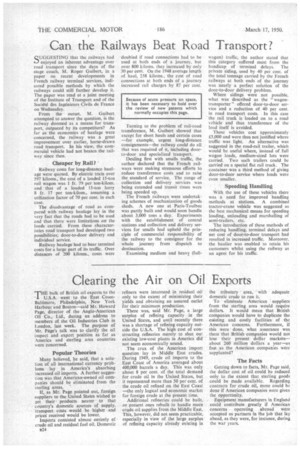Clearing the Air on Oil Exports T HE bulk of British
Page 58

If you've noticed an error in this article please click here to report it so we can fix it.
oil exports to the U.S.A. went to the East CoastBaltimore, Philadelphia, New York Harbour and Boston—said Mr. Howard Page, director of the Anglo-American Oil Co., Ltd., during an address to members of the Oil Industries Club in London, last week. The Purpose of Mr. Page's talk was to clarify the oil import and export position as far as America and sterling area countries were concerned.
Popular Theories
Many believed, be said, that a solution of all international currency problems lay in America's absorbing increased oil imports. A further suggestion was that American-owned oil cornpanics should be eliminated from the sterling areas. If, as Mr. Page pointed out, foreign suppliers to the United States wished to get, their products nearer to that country's domestic sources of supply, transport costs would be higher and price received would be lower. Imports consisted almost entirely of crude oil and residual fuel oil. Domestic B24 refiners were interested in residual oil only to the extent of minimizing their yields and obtaining an assured outlet for their minimum production.
There was, said Mr. Page, a large surplus of refining capacity in the United States, and until recently there was a shortage of refining capacity outside the U.S.A. The high cost of constructing refineries merely to shut out existing low-cost plants in America did not seem economically sound.
The crux of the American import question lay in Middle East crudes. During 1949, crude oil imports to the East Coast of America averaged about 400,000 barrels a day. This was only about 8 per cent, of the total demand for crude oil in the United States, but it represented more than 50 per cent. of the crude oil refined on the East Coast —the only logical and economic market for foreign crude at the present time.
Additional refineries could be built, or present ones rebuilt to handle more crude oil supplies from the Middle East. This, however, did not seem practicable, especially in view of the large surplus • of refining capacity already existing in the tributary area, with adequate domestic crude to run it.
To eliminate American suppliers from the sterling area would require dollars. It would mean that British companies would have to duplicate the. existing and costly facilities of the American concerns. Furthermore, if this were done, what assurance was there that British companies would not lose their present dollar markets— about 260 million dollars a year—as fast as the American companies were supplanted?
The Facts Getting down to facts, Mr. Page said, the dollar cost of oil could be reduced only to the extent that sterling goods could be made available. Regarding contracts for crude oil, more could be done if American companies were given the opportunity.
Equipment manufacturers in England could contribute greatly if American concerns operating abroad were accepted as partners in the job that lay ahead, as they were, for instance, during the war years.




























































































